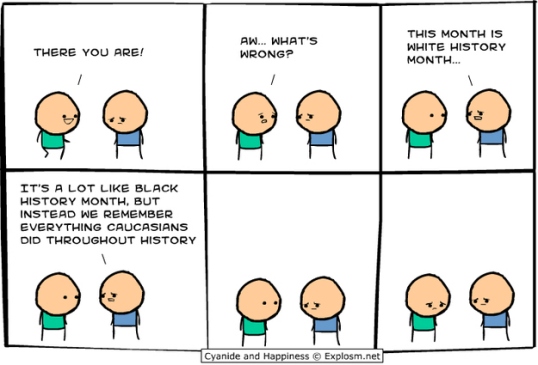White History Month
Every year without fail, during Black History Month, black people catch flack for celebrating, accused of racism for focusing only on black history and accomplishments. Often it’s asked, “Why don’t we have a White History Month?” Well, I thought I’d share something I saw on Facebook, a list of things that should be highlighted during that month, if ever created:
1 Cherokee Trail of Tears
2 Japanese-American internment
3 Philippine-American War
4 Jim Crow
5 The genocide of Native Americans
6 Transatlantic slave trade
7 The Middle Passage
8 The history of White American racism
9 Black Codes
10 Slave patrols
11 Ku Klux Klan
12 The War on Drugs
13 Treaty of Guadalupe Hidalgo
14 How white racism grew out of slavery and genocide
15 How whites still benefit from slavery and genocide
16 White anti-racism
17 The Southern strategy
18 The rape of enslaved women
19 Madison Grant
20 The Indian Wars
21 Human zoos
22 How the Jews became white
23 White flight
24 Redlining/Gentrification
25 Proposition 14
26 Homestead Act
27 Tulsa Riots/Black Wall Street
28 Rosewood massacre
29 Tuskegee Experiment
30 Lynching
31 Hollywood stereotypes
32 Indian Appropriations Acts
33 Immigration Act of 1924
34 Sundown towns
35 Chinese Exclusion Act
36 Emmett Till
37 Vincent Chin
38 Islamophobia
39 Indian boarding schools
40 King Philip’s War
41 Bacon’s Rebellion
42 American slavery compared to Arab, Roman and Latin American slavery
43 History of the gun
44 History of the police
45 History of prisons
46 History of white suburbia
47 Lincoln’s racism and anti-racism
48 George Wallace Governor of Alabama
49 Cointelpro
50 Dotbusters
51 School tracking
52 Mass incarceration of black men
53 Boston school busing riots
54. Man made Ebola and A.I.D.S.
55 Church Bombings and fires in deep south to Blacks
56. Church Shootings
57. How the Irish and Italians became white
58. The Perpetuation of the idea of the “model minority”
59. Housing discrimination
60. Systematic placement of highways and building projects to create ghettos
61. Medical experimentation on poor PoC (people of color) especially Blacks (including surgical and gynecological experimentation)
62. History of Planned Parenthood
63. Forced Sterilization
64. Cutting children out of pregnant Black mothers as part of lynchings
65. Eurocentric beauty standard falsification
66. Erasure and eradication of all achievements of Ancient Africa and Kemet
67. White-washing of history and cultural practices of PoC
68. Media manipulation and bias
69. Perpetuation of the myth of reverse racism
70. The history of white cannibalism
71. White Fragility
72. Indian Removal Act
73. Red Summer of 1919
74. Compromise of 1877
75. The Assassination of Dr King

And a perspective about Black History Month from Zipporah LeGarde:
Black History Month, as well as other history months based on racial history, aren’t racist. BHM is no more racist than Breast Cancer Awareness month is discriminatory against other types of cancer. Racism is defined as privilege plus power, and something that uses racial lines to instill a hierarchy in society, usually with white on the top. So, from a sociological standpoint, only Euro-Americans can exercise racism, but racial minorities can only be prejudiced.
That being said, the purpose of these months is to highlight the contributions racial minorities have made to the fabric of America. Some of you believe we don’t “need” these months, bringing up what Morgan Freeman said (regardless of the fact most black and other minority intellectuals have written countless articles rebuffing his point of view. Sorry y’all, Freeman is an actor, not a race scholar, and doesn’t speak for the entire black race – we are not monolithic in our blackness). But you’re not looking at the larger picture. Tell me when, in school, you learned about a minority in history that wasn’t Harriet Tubman, MLK, George W. Carver, *maybe* Malcolm X, you see the point? And you *probably* learned about them during BMH.
Black History IS American History, and if our educational system made more of an effort to incorporate minorities (including women) into the story of how America came to be, it would then be unnecessary. But to say it’s racist not only is a gross misunderstanding of what racism actually is, but totally ignores the fact our educational system is highly Euro-centric. When you’re a racial, gender, or a member of other minority group, it means a lot to have positive models from your camp, to let you know you can achieve what they did, that you can be as successful.

